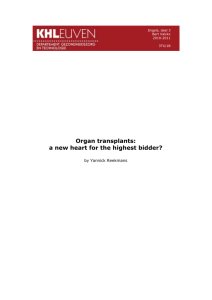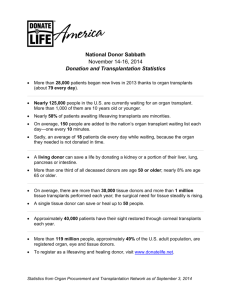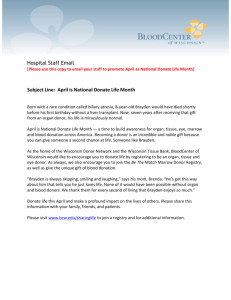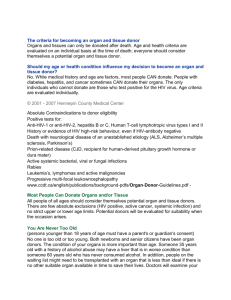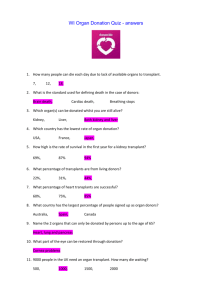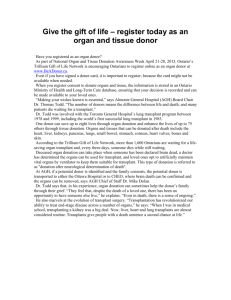organ DONATION OUTLINE
advertisement
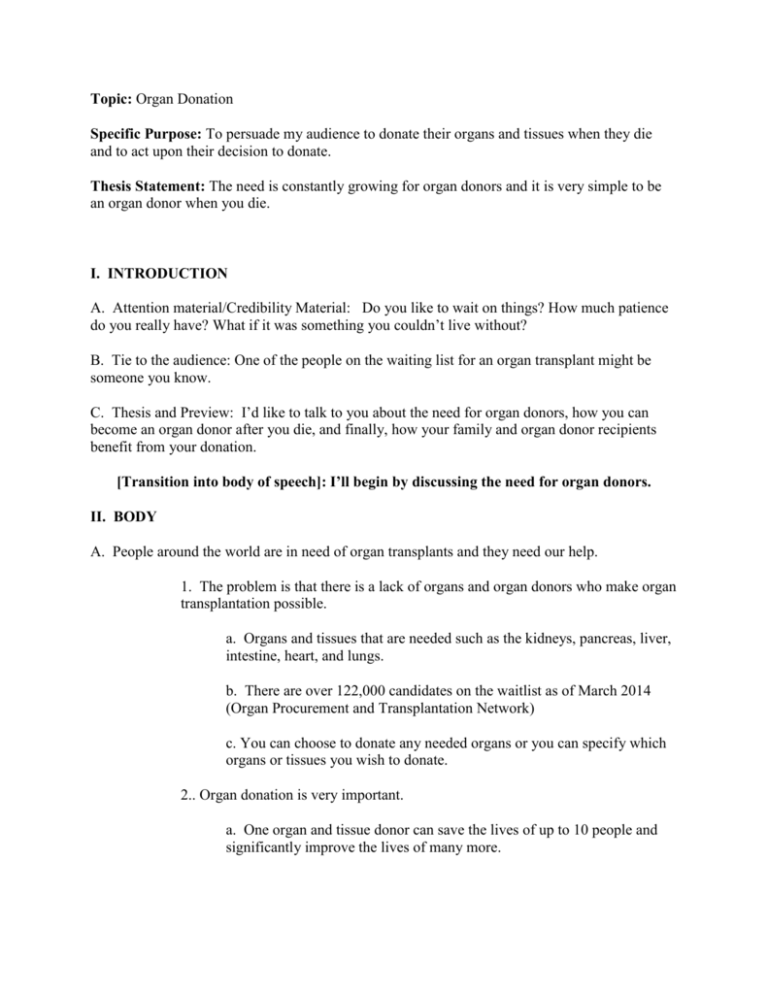
Topic: Organ Donation Specific Purpose: To persuade my audience to donate their organs and tissues when they die and to act upon their decision to donate. Thesis Statement: The need is constantly growing for organ donors and it is very simple to be an organ donor when you die. I. INTRODUCTION A. Attention material/Credibility Material: Do you like to wait on things? How much patience do you really have? What if it was something you couldn’t live without? B. Tie to the audience: One of the people on the waiting list for an organ transplant might be someone you know. C. Thesis and Preview: I’d like to talk to you about the need for organ donors, how you can become an organ donor after you die, and finally, how your family and organ donor recipients benefit from your donation. [Transition into body of speech]: I’ll begin by discussing the need for organ donors. II. BODY A. People around the world are in need of organ transplants and they need our help. 1. The problem is that there is a lack of organs and organ donors who make organ transplantation possible. a. Organs and tissues that are needed such as the kidneys, pancreas, liver, intestine, heart, and lungs. b. There are over 122,000 candidates on the waitlist as of March 2014 (Organ Procurement and Transplantation Network) c. You can choose to donate any needed organs or you can specify which organs or tissues you wish to donate. 2.. Organ donation is very important. a. One organ and tissue donor can save the lives of up to 10 people and significantly improve the lives of many more. b. Many people die each year waiting for the gift of a transplant. Some spend weeks or months in the hospital, while others make several trips to the hospital every week for dialysis or other treatment. [Transition: I’m sure that you can see the need for people like you to donate your organs. But you might be asking, well, how can I make sure my organs are donated after I die? Let me tell you.] B. This is how you go about making sure your organs are donated. 1. Visit the Donate Life America website at www.donatelife.net and choose your state of residence to learn about the options in your area. 2. Fill out, sign and carry a uniform donor card with you. 3. Letting your family or other loved one's know about your decision is vitally important. That's because family members are often asked to give consent for a loved one's donation, so it's important that they know your wishes. [Transition: You can see that it isn’t difficult to be an organ donor. Now let’s look at what may happen if you choose to donate or not. ] C. Organ donation benefits both the donor’s family and the recipients. 1. Stories of loss and hope, pain and joy and acts of selflessness — the emotions and experiences that are at the heart of organ donation and transplantation. Drake, a four year old, was involved in a swimming accident that caused him to have severe head injuries. His parents decided to donate his kidneys. The first candidate to receive them became very ill and was unable to receive them. However, two recipients benefited from Drakes kidneys. (Finger Lakes Donor Recovery Network) 2. If no one knows your wishes then your organs will not be donated. The consequences of this are more people waiting for organs and there will still be an incredible shortage of available organs. (See Power point) III. CONCLUSION: A. Brakelight/Transition: You have the power to donate your organs! It can be the greatest gift you could ever give. B. Summary: you know about the need for organ donors, how you can become an organ donor after you die, and finally, how your family and organ recipients benefit from your donation. C. Tie Back to the Audience: What if the person waiting on the list needing an organ transplant was someone you loved? D. Concluding Remarks: You have the power to donate your organs! Give the gift of life, make the life changing decision.

